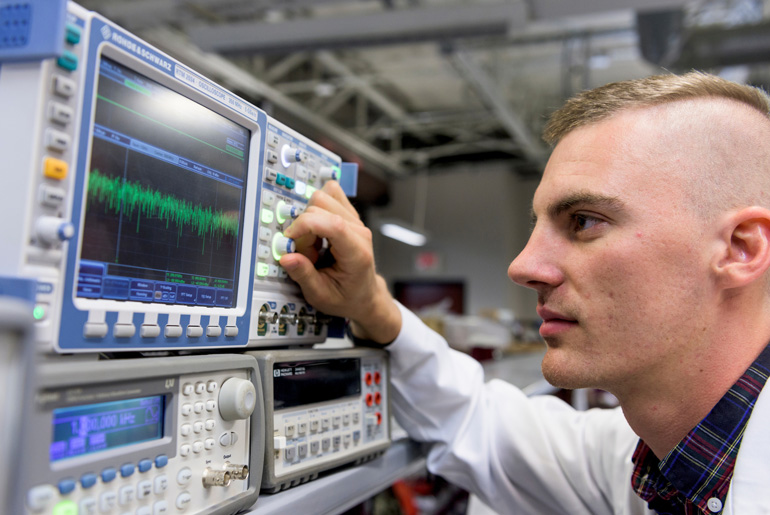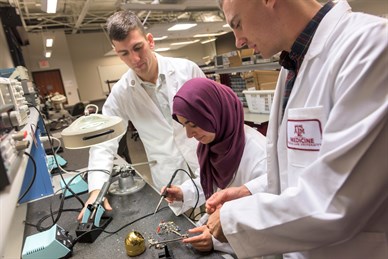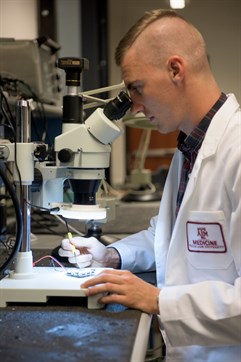
Engineering Medicine (EnMed), Texas A&M University’s innovative engineering medicine track at Houston Methodist Hospital in Houston, is now included in the Liaison Committee on Medical Education (LCME) accreditation of the Texas A&M College of Medicine’s Doctor of Medicine (M.D.) program. This approval allows the program to begin recruiting the inaugural class of students, set to matriculate in July 2019.

A partnership between the Texas A&M College of Engineering, College of Medicine and Houston Methodist Hospital, EnMed is the nation’s first four-year, fully integrated engineering and medical education curriculum leading to both a M.D. and master’s degree in engineering accredited by LCME.
“This news represents a major accomplishment, reflective of the extensive efforts between the Texas A&M College of Engineering, College of Medicine and Houston Methodist Hospital” said Dr. Amy Waer, vice dean of education and academic programs at the College of Medicine. “The successful development of this program is directly attributed to our faculty’s collaborative nature and adherence to the Aggie core values of leadership and excellence.”
EnMed will train a new type of physician engineer, the ‘physicianeer,’ who will be a practicing physician and a trained engineer. It is expected to be the largest engineering-based medical degree program in the nation. It is also the only program that allows graduates to receive both a doctorate of medicine and master’s in engineering in four years.
“EnMed will be a signature program for the Texas A&M College of Medicine and will serve the state by offering unique training that will advance health care technologies and ultimately the health of Texans,” said Dr. Carrie L. Byington, dean of the Texas A&M College of Medicine, senior vice president of the Texas A&M Health Science Center and vice chancellor for health services at The Texas A&M University System.
The proposed curriculum is a case-based format with integration of both medicine and engineering content to develop and improve student’s clinical reasoning and problem-solving skills through real-world examples. Students admitted into EnMed will have a bachelor’s degree in engineering, computer science or in selected instances, a closely related field.
“To effectively develop the technologies required to advance health care, engineering and medicine education should be integrated from the start—creating a mindset that sees medical needs, analyzes them and then creates the desired solutions,” said Dr. Roderic I. Pettigrew, CEO of EnHealth and executive dean for EnMed. “Through EnMed, we will generate a new class of clinicians who can actively participate in, and lead research, invention and entrepreneurial endeavors to improve health care.”
One of the tenets of EnMed is for students to design something transformational and take their invention to the marketplace prior to graduation. Utilizing the unparalleled, world-class facilities at the state’s top-ranked Houston Methodist Hospital and Houston Methodist Research Institute, students will have access to those on the leading edge of engineering medicine.

“This program will educate future physicians on how to effectively use their engineering skills to translate medical research into promising solutions for patients in a timely fashion,” said Dr. Tim Boone, co-director of the Institute for Academic Medicine at Houston Methodist and associate dean of the Houston campus for Texas A&M Health Science Center.
Several students with engineering backgrounds are piloting the new curriculum in preparation for the inaugural class, set to begin in 2019.
“Technology integration is the future of medicine and we anticipate that our graduates will be on the forefront of new developments in the field of medicine and engineering,” said Dr. M. Katherine Banks, vice chancellor and dean of Texas A&M Engineering. “Our students will be immersed in one of the greatest medical centers in the world and encouraged to revolutionize health care technology as it is known today.”
EnMed will initially hire 25 faculty members and utilize instructional and research space in the Texas Medical Center, including space in Houston Methodist Hospital, the Texas A&M Health Science Center’s Institute of Biosciences and Technology, and the adjacent 1020 Holcombe Building in the Texas Medical Center, that will be renovated to serve as the education and training campus for EnMed and EnHealth students.
The program will be reviewed for ongoing accreditation during the next LCME meeting in February 2020. Applications for the specialized program are expected to open this spring.
